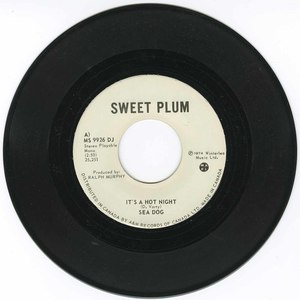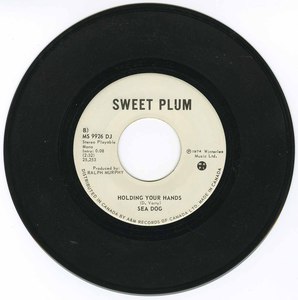Information/Write-up
Sea Dog — Sudbury grit, Toronto heat (1971–1975)
Sea Dog’s story begins in Sudbury’s vibrant but often overlooked 1960s scene, where young players cycled through names like the Wee Beasties, Queens Taxi, Taxi, and Tote Family before finally finding their stride. By the time the Tote Family rebranded, they had already tested Toronto waters with a couple of singles and earned a reputation as a powerful live act. Out of that experience—and a few inevitable lineup changes—came Sea Dog in 1971.
The first version of the band featured drummer Jim Norris, keyboardist and singer Doug Varty, bassist Mark Corbin, and guitarist Michael Argue. Argue left before they could record, replaced by Paul Weston on guitar and vocals. Soon after, Brian Kirkwood joined on bass and John Redmond came in on electric piano, giving the group its defining twin-keyboard sound. With new manager Terry Fillion, they secured a deal with MUCH Records, CHUM Radio’s short-lived label.
Through 1971 and 1972 Sea Dog issued a string of singles that built their reputation. The breakthrough was “It’s a Hot Night,” a swaggering rocker penned by Varty and paired with “Duster.” The song gained radio play across Canada and became their signature. Other singles followed, including “I Don’t Wanna Hear” backed with “Ain’t No Use” and “Rock and Roll Business,” all showcasing the band’s mix of boogie, blues rock, and radio-friendly hooks.
Early 1972 saw the release of their self-titled album, Sea Dog. Recorded for MUCH and distributed in the United States by Buddah Records, it brought together the group’s strongest originals, including “Rock and Roll Business,” “Ain’t No Use,” “I Don’t Wanna Hear,” and “Everybody,” a leftover from the Argue era. The record captured the energy of a band equally comfortable in sweaty Toronto clubs and opening for arena headliners, but despite international release the album didn’t break widely on the charts.
Sea Dog kept fighting for momentum. Later in 1972 they cut “How It Grows” backed with “Round and Round,” produced by Ralph Murphy, which nudged their sound closer to AM radio polish. In 1973 they returned with “Holding Your Hands” backed again with “Round and Round,” while also re-recording “It’s a Hot Night” for the Sweet Plum label in New York in hopes of pushing it further. Along the way they opened for April Wine, Lighthouse, Crowbar, A Foot in Coldwater, Fludd, and even major American names like Bob Seger, Ike & Tina Turner, and Sly and the Family Stone.
Despite the strong live following, the records never delivered a sustained hit, and the constant lineup shuffles took their toll. By 1975 Sea Dog had dissolved. The members carried on in different directions: Doug Varty formed Lowdown, which lasted well into the 1980s, and established himself as a respected session player; Paul Weston likewise became a sought-after studio musician; Jim Norris went on to found Canadian Musician magazine; and John Redmond entered the industry side, eventually working with PolyGram.
Sea Dog’s story is more than just a footnote—it represents one of the first times a band from Sudbury managed to push its way onto national charts, tour alongside Canadian heavyweights, and even secure U.S. distribution. Their short run in the early 1970s helped prove that talent from Northern Ontario could compete in the country’s biggest markets, inspiring later waves of musicians to take their own shot.
-Robert Williston



No Comments